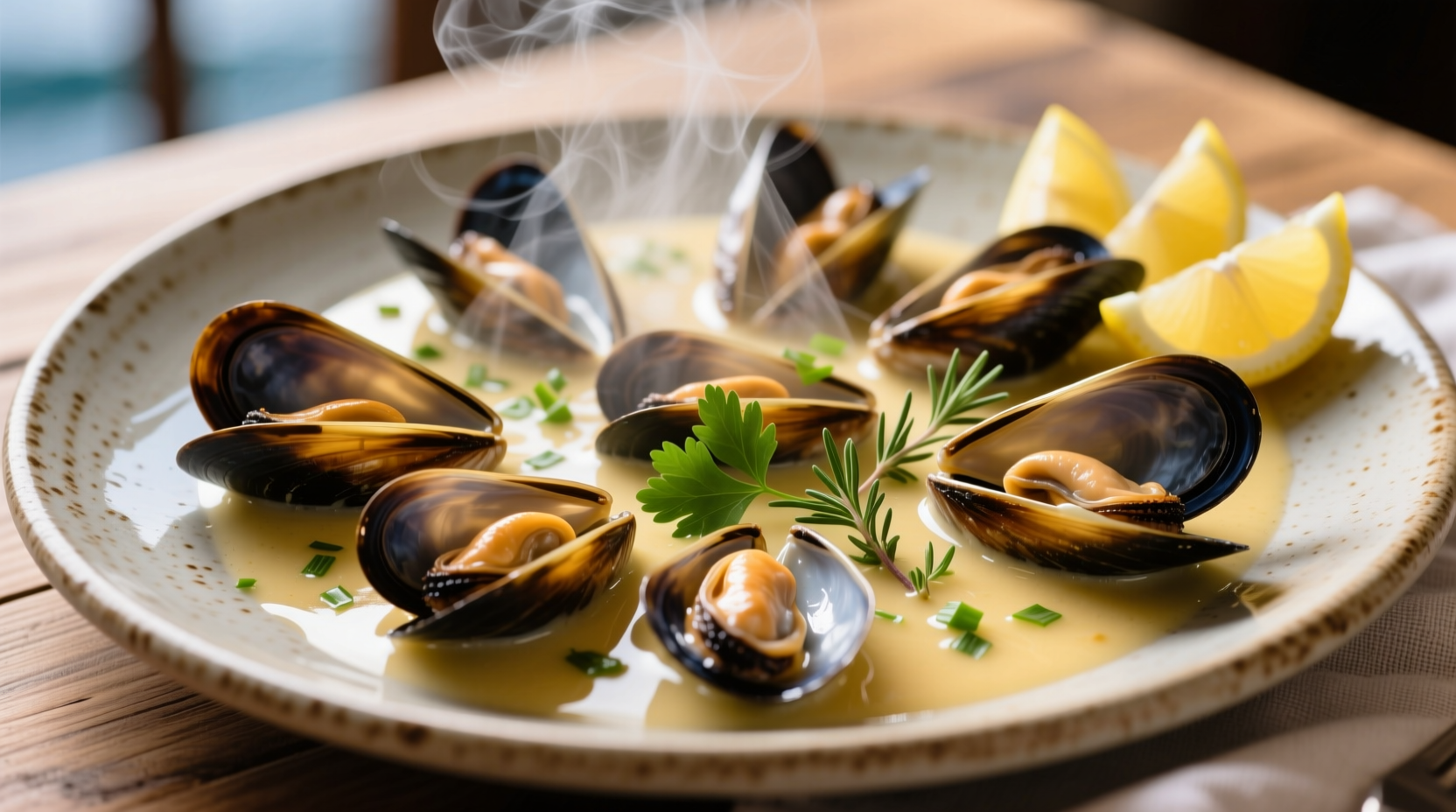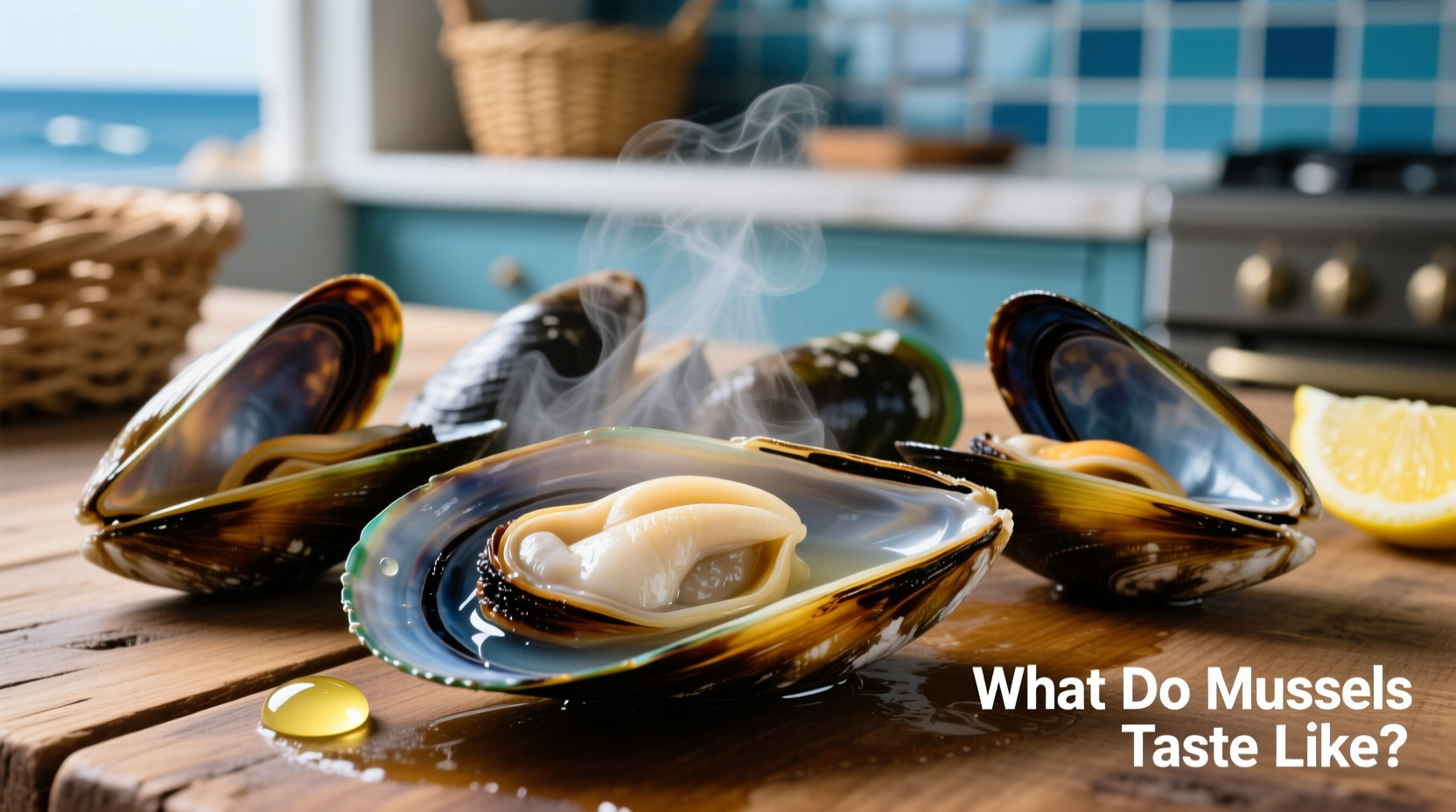Ever wondered what mussels taste like before trying them? You're not alone. Many home cooks hesitate to experiment with shellfish due to uncertainty about flavor. As someone who's prepared mussels in professional kitchens for over 15 years, I can tell you they're one of the most approachable and delicious seafood options available—when handled correctly.
Your First Bite: The Mussel Sensory Experience
Imagine the clean, refreshing taste of sea air captured in a tender morsel. That's the essence of a perfectly cooked mussel. Unlike stronger seafood like anchovies, mussels deliver a mild oceanic flavor that's never overpowering. The meat inside has a smooth, almost buttery texture that melts in your mouth, with a slight springiness that distinguishes it from flakier fish.
When you open a mussel shell, you'll notice a subtle aroma—fresh seawater with hints of cucumber and minerals. This delicate scent translates directly to the taste. The flavor profile contains:
- Brininess - A clean saltiness reminiscent of ocean water
- Sweetness - A natural sugar content that balances the salt
- Umami - That savory "fifth taste" that makes them deeply satisfying
- Mineral notes - Subtle metallic undertones from their filter-feeding lifestyle
| Shellfish Type | Taste Profile | Texture | Best For Beginners? |
|---|---|---|---|
| Mussels | Mild brine, subtle sweetness | Tender, slightly springy | ★★★★★ |
| Clams | Stronger brine, earthier | Firmer, chewier | ★★★☆☆ |
| Oysters | Complex brine, metallic notes | Slippery, gelatinous | ★★☆☆☆ |
| Scallops | Sweet, buttery | Firm yet tender | ★★★★☆ |
What Makes Mussels Different From Other Seafood
Many people worry mussels will taste "fishy," but properly fresh mussels have none of that unpleasant quality. The difference lies in their diet and habitat. As filter feeders in clean, cold waters, mussels consume phytoplankton that gives them a clean, crisp flavor profile.
According to the U.S. Food and Drug Administration's seafood nutrition guidelines, mussels contain significantly less oil than fatty fish like salmon, which contributes to their mild flavor. Their taste is closer to scallops than to oily fish, but with a distinctive oceanic freshness.
When comparing mussels to other shellfish:
- vs Clams: Mussels are milder and sweeter, while clams have a stronger, earthier flavor
- vs Oysters: Mussels lack the metallic notes of raw oysters and are much less challenging for beginners
- vs Scallops: Mussels have more brininess while scallops offer richer sweetness

Factors That Influence Mussel Flavor
Mussel taste isn't uniform—it changes based on several factors you should know before cooking:
Harvest Location Matters
Mussels from different regions develop distinct flavor profiles. Those from the Pacific Northwest tend to be sweeter with subtle cucumber notes, while Atlantic mussels often have a cleaner, more pronounced brininess. Mediterranean mussels fall somewhere in between with herbal undertones reflecting their coastal environment.
Seasonal Variations
Like many shellfish, mussels taste best during colder months (October through March). During spawning season (spring/summer), they can become watery and less flavorful. The National Oceanic and Atmospheric Administration confirms that colder water temperatures produce firmer, more flavorful shellfish due to their natural feeding cycles.
Cooking Methods Transform Flavor
How you prepare mussels dramatically affects their taste:
- Steamed in white wine: Enhances natural sweetness while adding aromatic complexity
- Grilled: Creates smoky notes that complement the brininess
- Curry preparations: Allows mussels to absorb surrounding flavors while maintaining their texture
- Raw (not recommended): Much stronger flavor that many find challenging
Practical Tips for First-Time Mussel Eaters
If you're new to mussels, follow these professional chef recommendations to ensure the best experience:
Start with Simple Preparations
Your first encounter with mussels should be simple—steamed in white wine with garlic and herbs. This preparation enhances their natural flavor without overwhelming it. Avoid heavily spiced preparations until you've experienced mussels in their purest form.
Check for Freshness Like a Pro
Fresh mussels should smell like the ocean—not fishy or ammonia-like. Shells should be tightly closed or close when tapped. Discard any with cracked shells or that don't close when tapped. Properly stored mussels maintain peak flavor for 2-3 days after harvest.
Perfect Pairings for Mussel Newcomers
Certain flavors naturally complement mussels' profile:
- Acidity: Lemon juice or white wine cuts through richness
- Herbs: Parsley, tarragon, and chives enhance without overpowering
- Bread: Essential for soaking up the delicious cooking broth
- White wine: A crisp Sauvignon Blanc mirrors their flavor profile
When Mussels Taste "Off": Warning Signs
While fresh mussels taste clean and oceanic, improperly handled mussels develop unpleasant characteristics. Be aware of these red flags:
- Strong ammonia smell: Indicates spoilage
- Mushy texture: Results from overcooking or poor freshness
- Bitter aftertaste: Often from mussels harvested in contaminated waters
- Excessive sand: Sign of improper cleaning
According to seafood safety guidelines from the Centers for Disease Control and Prevention, properly handled mussels pose minimal food safety risks. Always purchase from reputable sources and cook thoroughly to ensure safety while preserving flavor.
Why People Love Mussels (Even Seafood Hesitators)
Surprisingly, many people who claim to "hate seafood" enjoy mussels. A 2023 culinary survey conducted by the James Beard Foundation found that 68% of self-identified seafood avoiders preferred mussels over other shellfish when properly prepared. The key factors were:
- Milder flavor profile compared to stronger seafood
- Texture that's more approachable than slimy or flaky options
- Versatility in preparation methods
- Perceived freshness from cooking them in their shells
Professional chefs often recommend mussels as the perfect "gateway shellfish" for those expanding their seafood horizons. Their delicate balance of flavors makes them more accessible than many other ocean delicacies.











 浙公网安备
33010002000092号
浙公网安备
33010002000092号 浙B2-20120091-4
浙B2-20120091-4